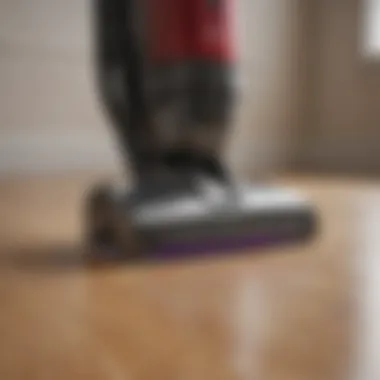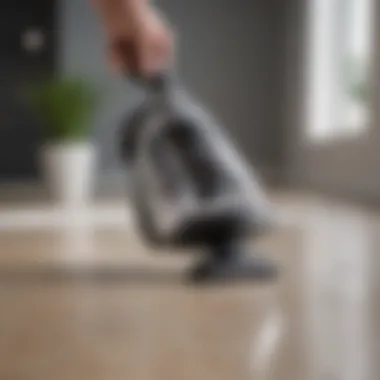Reliable Vacuum Cleaners: Your Ultimate Buying Guide


Intro
In the landscape of household appliances, vacuum cleaners hold a vital role. They simplify the complex task of tidying spaces while effectively maintaining cleanliness. Understanding what makes a vacuum cleaner reliable can greatly influence consumer choices. With various models available, determining the right fit can seem daunting. This article aims to elucidate these choices, guiding readers through essential considerations when selecting their next vacuum.
Understanding Categories of Vacuum Cleaners
Vacuum cleaners come in various forms, each designed for specific cleaning needs. Some main categories include:
- Upright Vacuum Cleaners: Known for their powerful suction and ease of use, upright models typically excel in cleaning carpets. They often feature various attachments for versatility.
- Canister Vacuum Cleaners: Ideal for both hard floors and carpets, these models separate the motor from the suction head. Their lightweight design and maneuverability make them suitable for intricate spaces.
- Robotic Vacuum Cleaners: These automated devices operate independently, navigating rooms without human intervention. They are convenient for maintenance cleaning but may lack the deep cleans of other categories.
- Stick Vacuum Cleaners: Compact and easy to store, stick vacuums are designed for quick clean-ups. They offer a balance between power and convenience, making them popular among urban dwellers.
Evaluating Features to Ensure Reliability
In assessing vacuum cleaners, examining their features is crucial for making an informed decision. Consider the following elements:
- Suction Power: A vacuum's effectiveness largely hinges on its suction capabilities. Higher wattage typically translates to better performance.
- Filtration Systems: Advanced filtration, such as HEPA, traps allergens and improves indoor air quality. For homeowners with pets or allergies, this feature is particularly beneficial.
- Attachments and Accessories: Models that include a range of tools can enhance versatility, allowing for various applications like upholstery cleaning or edge cleaning.
- Durability: Look for vacuums constructed of strong materials. A well-built cleaner will withstand regular use and last longer.
Maintenance and Upkeep
Proper maintenance is essential to ensure longevity and maximize performance. Here are some tips:
- Regular Filter Cleaning: Clogged filters can impede suction power. Following the manufacturer's recommendations for cleaning or replacing filters is essential.
- Emptying the Dust Bin: Keeping the dust bin clear enhances suction and efficiency. Empty it frequently, especially after large cleaning jobs.
- Cord Management: For corded models, ensuring the cord is stored properly can prevent wear and damage.
"A reliable vacuum cleaner not only simplifies your cleaning routine but also contributes to a healthier home environment."
Closure
Choosing the right vacuum cleaner does not have to be an overwhelming task. By understanding different categories, evaluating essential features, and practicing routine maintenance, homeowners can find a vacuum that not only meets their cleaning needs but also stands the test of time. Armed with this knowledge, consumers can make choices that align with their lifestyles and preferences.
Intro to Vacuum Cleaners
Understanding vacuum cleaners is essential for effective home maintenance. The function of a vacuum cleaner is to remove dirt, debris, and allergens from various surfaces. With a wide variety of options available, choosing the right model can significantly enhance cleaning efficiency. In this article, we highlight critical aspects to consider while selecting a vacuum cleaner. A thorough examination of different types, features, and market options helps homeowners make informed decisions.
Purpose of the Article
The purpose of this article is to aid readers in identifying reliable vacuum cleaners. Consumers face numerous options in today’s market, leading to potential confusion. By compiling valuable information regarding various models and brands, this guide aims to simplify the selection process. The intent is to provide insights that help individuals find a vacuum cleaner best suited to their unique needs. Furthermore, the article discusses not only performance attributes but also durability and customer support factors. Understanding these elements supports readers in making choices that will serve them well in the long term.
Importance of Choosing the Right Vacuum Cleaner
Selecting the right vacuum cleaner is critical for maintaining a clean and healthy environment. Different floor types, pets, and personal cleaning preferences play vital roles in the decision-making process. For instance, a pet owner may prioritize a vacuum's ability to remove hair and allergens, while someone with hard floors might focus on suction power and brush design.
Here are some notable considerations when choosing a vacuum cleaner:
- Cleaning Efficiency: A suitable vacuum cleaner maximizes dirt and allergen removal in minimal time.
- Cost-effectiveness: Investing in a reliable model may reduce long-term costs related to repairs and replacements.
- Convenience: Features such as lightweight design and maneuverability can enhance usage experience.
"Investing time in selecting a vacuum leads to better cleaning results and improved home hygiene."
Ultimately, understanding the nuances of various models and their specifications empowers consumers. Being educated ensures satisfaction and enhances the overall cleaning routine.
Understanding Vacuum Cleaner Types
Understanding the different types of vacuum cleaners is crucial for effective decision-making when selecting the ideal model for your cleaning needs. Each type comes with its unique features, strengths, and limitations, making it imperative to assess them according to your specific lifestyle and home environment. This section seeks to outline the notable characteristics of each vacuum type, assisting readers in discerning which option aligns best with their cleaning routines.
Upright Vacuum Cleaners


Upright vacuum cleaners are well-regarded for their powerful suction capabilities. These models are designed to stand on their own, making them easy to store. They are often equipped with a larger dustbin or bag, which can hold considerable debris, thus reducing the frequency of emptying.
The design of upright vacuums often lends itself to deep cleaning carpets, making them particularly advantageous for households with wall-to-wall carpeting. However, their bulkiness can be a disadvantage when it comes to maneuvering around furniture. Upright models typically work well for larger cleaning tasks and are suitable for people who prefer a straightforward and efficient cleaning process.
Canister Vacuum Cleaners
Canister vacuum cleaners present a different approach to cleaning. Comprising a separate canister and hose, these vacuums allow for greater flexibility. Users can easily navigate tight corners and clean various surfaces, from carpets to hardwood floors. This type of vacuum cleaner is often lighter and quieter than its upright counterparts.
Moreover, canister models can come equipped with specialized attachments that enhance cleaning capabilities for upholstery and delicate surfaces. They are ideal for homes with a mix of flooring types and for individuals who require a more versatile cleaning tool. However, the separate canister can be cumbersome to drag along, depending on the design.
Robot Vacuum Cleaners
Robot vacuum cleaners have revolutionized the cleaning routine for many homeowners. These autonomous devices scan the home and perform cleaning tasks without manual operation. They are equipped with sensors to navigate around furniture and avoid obstacles effectively. This hands-free approach allows users to save time while ensuring regular upkeep of their living spaces.
While robot vacuums offer convenience, they often lack the power found in traditional models. Their smaller dustbins require frequent emptying, and they may not be as effective on high-pile carpets. Nonetheless, they are perfect for maintaining cleanliness in homes where daily upkeep is essential. However, expecting them to replace more traditional vacuums for thorough cleaning may not be realistic.
Handheld Vacuum Cleaners
Handheld vacuum cleaners are compact devices designed for quick clean-ups and spot cleaning. Their lightweight form makes them ideal for cleaning car interiors, small spills, and hard-to-reach areas. Despite their convenience, many handheld models possess limited battery life and suction strength when compared to full-sized vacuums.
These vacuums are valuable for specific tasks, such as cleaning pet hair from furniture or picking up crumbs from countertops. However, they may not be suitable for comprehensive cleaning of larger areas. Homeowners with diverse cleaning demands may consider incorporating a handheld option into their toolkit for quick clean-ups.
"Understanding the types of vacuum cleaners helps you make a better decision when purchasing. Assess your needs before picking a type."
In summary, familiarizing yourself with vacuum cleaner types sets a strong foundation for making a reliable purchase. Each type serves a different purpose, and matching the right model to your cleaning needs will optimize your cleaning experience. Understanding these distinctions will guide effective cleaning practices in your home.
Key Features to Evaluate
Evaluating a vacuum cleaner requires an understanding of several vital features. These elements directly impact the functioning, convenience, and overall effectiveness of the vacuum. Recognizing what makes a vacuum cleaner reliable can lead to better cleaning results and easier maintenance, thereby enhancing your overall cleaning experience. Below are the key features to consider:
Suction Power
Suction power is perhaps the most critical feature to consider when selecting a vacuum. It determines how effectively the cleaner can pick up dirt, dust, and debris. Higher suction power correlates with better performance on various surfaces, from carpets to hard floors. It is essential not just to look at overall power but to understand how that power translates to suction at the nozzle.
The type of motor can also influence suction. For instance, some brands use cyclonic action to maintain consistent suction even as the dirt tank fills. This feature is particularly advantageous for household owners with pets, as pet hair can clog lesser models quickly. As a benchmark, a vacuum with a suction power of 200 AW (Airwatts) is generally sufficient for home use.
Filtration Systems
Filtration systems are another crucial feature worth considering. They determine how well the vacuum retains dirt and allergens. Many modern vacuums incorporate HEPA (High Efficiency Particulate Air) filters. These filters can capture nearly 99.97% of particles that are 0.3 microns or larger. This level of filtration is especially important for those who suffer from allergies or have respiratory concerns.
Check whether the vacuum offers washable* filters and how easy it is to replace them. A complex replacement process can lead to neglect, affecting the machine's performance and your home’s air quality. It is beneficial to select models that provide clear information about filter lifetime and maintenance requirements.
Capacity and Weight
Capacity pertains to the amount of dust and debris a vacuum cleaner can hold. This is often measured in liters or quarts. A vacuum with larger capacity means less frequent emptying, improving convenience during larger cleanup tasks.
Weight is just as essential, particularly for those who must move the vacuum around frequently. Generally, lighter vacuums are easier to maneuver and carry. However, consider your home layout. If you have stairs or various levels, the weight becomes a significant factor. Ideally, aim for a balance between capacity and weight to meet your home cleaning needs effectively.
Noise Levels
The noise level of a vacuum cleaner is a feature often overlooked. Higher decibel levels can be disruptive, especially in households with young children, pets, or during late-night cleaning sessions. Check for models that specify their noise levels in decibels (dB). A machine operating below 70 dB is usually considered quiet. Some brands even optimize motor designs for reduced noise, so it is worth exploring those options.
Evaluating Reliability in Vacuum Cleaners
Evaluating the reliability of vacuum cleaners is a crucial step for any potential buyer. This assessment goes beyond just brand names or price tags. Reliability relates to how well a vacuum performs over time, including its ability to pick up dirt, maintain suction power, and endure wear and tear. Homeowners and design enthusiasts alike want to invest in a vacuum cleaner that not only meets immediate cleaning needs but also lasts long without frequent repairs or replacements.


Reliability can translate to savings when one considers the cost of maintenance and repairs in the long run. A reliable vacuum cleaner can enhance the overall cleaning experience, ensuring that various surfaces are thoroughly cleaned with minimal effort. Therefore, when evaluating options, take a deep dive into specific elements that highlight reliability.
Consumer Reviews and Ratings
Consumer reviews and ratings serve as a valuable source of information. They can provide insights into real-life performance that manufacturers often do not disclose. Often, buyers share their experiences regarding how vacuum cleaners operate under different conditions, which can inform potential purchasers about what to expect.
- Look for patterns in reviews. If many users report similar issues, that is a strong indicator of reliability or the lack thereof.
- Ratings can also offer a snapshot of general satisfaction. A high-rating vacuum with numerous reviews tends to be a wise choice, as it often reflects consistent performance.
Brand Reputation
The reputation of a brand plays a significant role in evaluating reliability. Established brands such as Dyson, Hoover, and Bissell have built trust over many years. Customers often feel more secure purchasing from well-known manufacturers, as these brands typically offer commitment to quality and customer service.
Reputation can be researched through various platforms, including online forums, Reddit, and consumer protection websites. Additionally, consider how brands handle product recalls and customer complaints; a company that responds promptly to issues often is more reliable than one that does not.
Warranty and Customer Support
Analyzing the warranty and customer support policies is essential for assessing reliability. A longer warranty period often indicates that a company stands behind its product. For instance, a vacuum cleaner with a five-year warranty may inspire more confidence than one with only a one-year warranty.
Moreover, customer support is vital. Knowing that you can reach out for help if your vacuum has technical issues can provide peace of mind. Check what kind of support channels are available—whether through phone, email or chat—and read reviews about the responsiveness of the customer service team.
A vacuum cleaner's reliability hinges on multiple factors, including consumer feedback, brand reputation, and support systems. Understanding these can lead to smarter purchasing decisions.
Current Market Leaders
Understanding the current market leaders in vacuum cleaners is essential for consumers who want reliability and performance. The brands that dominate the market are often tested against various metrics, such as customer satisfaction, innovation, and product durability. Identifying these leaders can guide buyers toward wise purchasing decisions. When it comes to selecting a vacuum cleaner, knowing which brands are recognized for their quality can save time and enhance the overall user experience.
Top Brands Overview
When exploring vacuum cleaners, several brands emerge consistently as top contenders. Brands like Dyson, Shark, and Miele are frequently recommended due to their commitment to quality and customer service.
- Dyson is well-known for its bagless technology and powerful suction abilities. Their design focus also emphasizes ease of use and innovation.
- Shark offers models that balance affordability with high performance. Their vacuums often feature advanced cleaning technologies at a reasonable price.
- Miele, on the other hand, is synonymous with durability. Known for their canister vacuums, Miele often gets praised for both aesthetics and functionality.
These brands not only invest in research and development but also prioritize customer feedback. This responsive approach results in high standards for safety and usability.
Best Models by Category
Determining the best vacuum cleaners involves evaluations across different categories. Each category has its standout models that excel in specific areas of performance. Here are some notable examples:
- Upright Vacuum Cleaners: The Dyson Ball Animal 2 stands out in this category for its strong suction and ability to pick up pet hair easily.
- Canister Vacuum Cleaners: The Miele Complete C3 is renowned for its versatility and filtration system, making it ideal for allergy sufferers.
- Robot Vacuum Cleaners: The iRobot Roomba i7+ offers advanced navigation and smart home integration, making cleaning effortless.
- Handheld Vacuum Cleaners: The Black+Decker Dustbuster is a reliable choice, praised for its compact design and convenience in small clean up tasks.
Each of these models reflects current trends, such as power, convenience, and specialized cleaning technology. Analyzing these options aids in making informed decisions based on individual cleaning needs.
Practical Considerations for Selection
When it comes to selecting a vacuum cleaner, practical considerations play a pivotal role. Understanding these factors ensures that homeowners make informed and suitable choices based on their specific needs. It is essential to factor in budget constraints, the home environment, floor types, and the maintenance required for the vacuum cleaner. Each consideration contributes to the overall effectiveness and longevity of the appliance, allowing users to maximize their investment in cleaning technology.
Budget Constraints
A crucial element in the selection process is the budget. Vacuum cleaners come in a wide price range, from affordable models to high-end versions with advanced features. Establishing a clear budget helps narrow down choices and prevents overspending. It is important to assess the features that matter most to you and weigh their importance against the total cost.
- Entry-level models often provide basic functionality suitable for light cleaning tasks.
- Mid-range options may include additional features such as better filtration or enhanced suction power.
- Premium models typically offer advanced technology, providing superior performance and durability.
Consumers should research product reviews and assess the long-term cost of ownership, which includes considerations of repairs, maintenance, and energy efficiency. By understanding the value within different price brackets, users can make smart investments.
Home Environment and Floor Types


The home environment significantly influences the choice of vacuum cleaner. Different floor types require different cleaning approaches. For example, hardwood floors need vacuums with soft brushes to avoid scratches, while carpets benefit from units with strong suction to extract dirt effectively.
Consider the following:
- Rugged carpets may require an upright vacuum cleaner designed for deep cleaning.
- Hardwood or tile floors often perform better with a canister vacuum that offers more maneuverability.
- Combination floor types suggest the need for a versatile vacuum that can adapt to various surfaces.
Identifying the primary surfaces in your home will lead to a more efficient vacuuming process. Moreover, pets and allergies are also factors to consider. Specifically designed vacuums with HEPA filters can manage pet hair and allergens, ensuring a healthier living environment.
Maintenance and Upkeep
Ongoing maintenance is essential for maximizing a vacuum’s performance and lifespan. Selecting a model known for ease of maintenance can save both time and money over the long run. Some essential maintenance practices include:
- Regularly changing or cleaning filters to maintain optimal suction power.
- Emptying dust canisters or replacing bags when they reach capacity to avoid clogs.
- Inspecting hoses and attachments for blockages or wear.
Consumers should also look into the warranty and support offered by the manufacturer, as it can provide peace of mind if issues arise. Choosing a vacuum that is easy to maintain means less hassle and greater satisfaction in your cleaning routine.
"A well-chosen vacuum cleaner can transform your cleaning experience, making it easier and more effective. Selecting one based on practical considerations ensures that you get the most out of your investment."
By thoughtfully evaluating these practical considerations, you can ensure that your vacuum cleaner meets your specific needs, leading to a more effective cleaning routine.
Comparative Analysis of Vacuum Models
Understanding the comparative analysis of vacuum models is vital in making an informed decision when purchasing a vacuum cleaner. This section delves into how different models perform relative to each other, assessing their strengths and weaknesses. By scrutinizing various options, consumers can identify the model that best suits their needs. The advantages of this analysis include the ability to weigh factors such as efficiency, usability, and features across different vacuum types.
Performance Tests
Conducting performance tests on vacuum models reveals significant insights into their operational capabilities. These tests often evaluate key aspects such as suction power, maneuverability, and the effectiveness of their filtration systems.
- Suction Power: This is a crucial metric since it directly influences how effectively a vacuum can pick up dirt and debris. Stronger suction means better performance on various surfaces.
- Maneuverability: How well a vacuum navigates around furniture and tight spaces is often tested. A model that is difficult to maneuver may be less appealing for daily use.
- Filtration Efficiency: Performance testing includes checking how well the vacuum retains dust and allergens. Models with HEPA filters typically perform better in this aspect.
These tests provide a clearer picture of how vacuums perform in real-life scenarios rather than just relying on specifications provided by manufacturers.
Durability Assessments
Evaluating durability offers insight into how long a vacuum cleaner is likely to last, which is vital for assessing its overall value. Durability assessments involve several factors:
- Build Quality: The materials used in construction can significantly affect longevity. Models made from high-grade plastics or metals often withstand wear better than cheaper alternatives.
- Component Lifespan: Certain parts, like motors and belts, are tested for their longevity. Knowing how often such components may need replacement aids in estimating long-term costs.
- User Feedback: Insights from consumers who have used the models over time can highlight common issues related to durability which technical specifications may overlook.
"Durability is not just about sturdiness but also about how well a model maintains its performance over time."
Finale and Recommendations
In summarizing the quest for identifying the most reliable vacuum cleaners, it is crucial to understand the overarching importance of making informed choices. A good vacuum cleaner can significantly enhance your cleaning efficiency, thereby optimizing your time and efforts. The information provided in this article aims to guide homeowners, interior design enthusiasts, party hosts, and gardening aficionados in their selection process. The careful evaluation of various vacuum types, their features, and performance will directly impact the satisfaction and effectiveness of home maintenance tasks.
Choosing the right vacuum cleaner is not just about buying a product; it involves understanding your unique cleaning needs and how different models can meet those needs. Factors like suction power, filtration systems, and durability can make a significant difference in overall performance. Being aware of these elements will equip you to choose a vacuum cleaner that serves your lifestyle and environment effectively.
Furthermore, the comparison of leading models available in the market provides valuable insights into consumer preferences and brand reputation. Recommendations are essential in helping you navigate through vast choices that can often be overwhelming. Reliable brands typically offer essential customer support and warranty services that protect your investment.
Final Thoughts on Vacuum Selection
When approaching vacuum selection, consider the various environments and situations in which the vacuum will be used. The choice between upright, canister, or robotic models should align with your specific home layout and lifestyle. To summarize:
- Upright Vacuums are often best for larger carpeted areas.
- Canister Models excel in versatility and portability, ideal for homes with mixed flooring.
- Robotic Vacuums provide convenience, perfect for busy households.
- Handheld Options are suited for quick clean-ups and hard-to-reach spots.
By carefully considering these aspects, you can select a vacuum cleaner that will meet expectations in terms of performance, durability, and reliability.
Encouragement for Informed Choices
Take the time to read consumer reviews, and pay attention to recommended brands. Engage with communities like reddit.com to understand user experiences. Additionally, scrutinizing warranty information and after-sales support can provide peace of mind regarding your purchase.
Ultimately, the objective is to empower yourself with knowledge and insights. The right vacuum cleaner can free up time and energy for what truly matters, making your cleaning routine less of a chore and more of a streamlined process. Make your choices wisely, and enjoy the benefits of a clean, comfortable living space.







